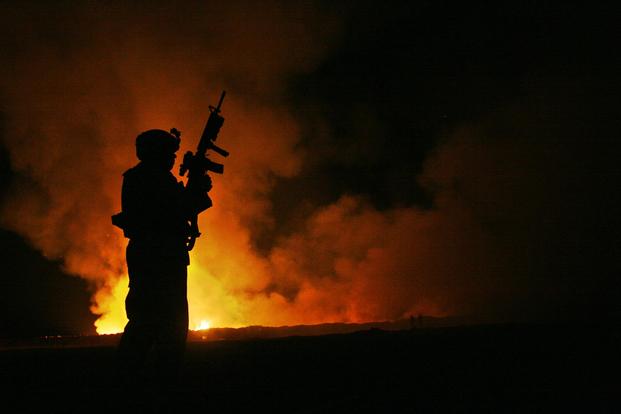The U.S. Supreme Court has signaled that it is considering a case involving a Texas state trooper who claims he lost his job after deploying to Iraq and becoming sick as a result of exposure to burn pits.
The high court on Monday invited the federal government to provide an opinion on the case, LeRoy Torres v. the Texas Department of Public Safety, indicating that the justices are scrutinizing it.
At issue is whether Texas violated the Uniformed Services Employment and Reemployment Act, or USERRA, which prohibits employers from firing or demoting National Guard and Reserve members who must leave their civilian jobs to train or deploy.
Read Next: Navy WAVE, WWII Code Breaker Will Celebrate 100th Birthday With Her Own Parade
In 2007, Army Reserve Capt. LeRoy Torres deployed to Joint Base Balad, a site with a 10-acre, open-air burn pit that Torres and others say belched smoke over work sites and quarters for years. Torres said exposure to the smoke, which contained dioxin and other chemicals, as well as fine particulate matter, caused chronic cognitive issues and constrictive bronchiolitis, a debilitating lung condition characterized by scarring of the lung's smallest airway branches.
When Torres returned home, he sought to continue working as a state trooper. But according to the Texas attorney general's office, his respiratory condition prevented him from "serving on the road."
Torres said he requested an administrative position and provided a list of tasks he could still do but instead was encouraged to resign. He says he was told he had to do so in order to apply for disability retirement.
The state then rejected his disability retirement application.
The Texas attorney general's office has said in court documents that Torres was offered an administrative position but was placed on leave because he had missed too much work as a result of his illness.
Torres sued the state, arguing that it was required to make accommodations for his service-connected disability. He sought more than $1 million in lost wages and retirement pay.
Texas argued that the case should be dismissed because all states have sovereign immunity against private damage suits over a federal law, unless Congress specifically waives its immunity.
The state won, with a lower court denying Torres' claim. The Texas Supreme Court had considered hearing the case and ultimately decided not to, setting the stage for a petition to the U.S. Supreme Court.
Roughly 800,000 current or former Reserve and National Guard members work in state or local government jobs across the country. Whether others have been fired or pressured to resign as a result of their military service is unknown.
The decision by the justices to ask Acting Solicitor General Elizabeth Prelogar to provide input signals they are interested in determining the case's national implications, said Counsel of Record Andrew Tutt with the law firm Arnold & Porter in Washington, D.C.
"The Court's decision to ask ... shows that the Court recognizes that this case could have important consequences not only for individual service members but for our country's military readiness and the constitutional power of the federal government to wage war successfully," Tutt said. "We are very pleased that the Court has asked the United States to weigh in on this important case that affects the rights of thousands of service members all across the country."
More than 208,000 service members and veterans have enrolled in the Department of Veterans Affairs Airborne Hazards and Open Burn Pit Registry, an accounting of those who have served in the Middle East since 1990 and have concerns about deployment-related health.
Torres and his wife, Rosie, founded Burn Pits 360 in 2011 to advocate for service members whose lives were affected by exposure to air pollution and other toxins in Iraq, Afghanistan and elsewhere.
Rosie Torres said Monday that the couple is thrilled that their case continues, adding that it is "not just about us."
"We and thousands of other families have been through so much. This is a law that would protect those who work for state and local governments who have given much to their country," she added.
-- Patricia Kime can be reached at Patricia.Kime@Monster.com. Follow her on Twitter @patriciakime
Related: Lawmakers Investigate Cancer Cluster Among Veterans Who Served at 'K2' Base












